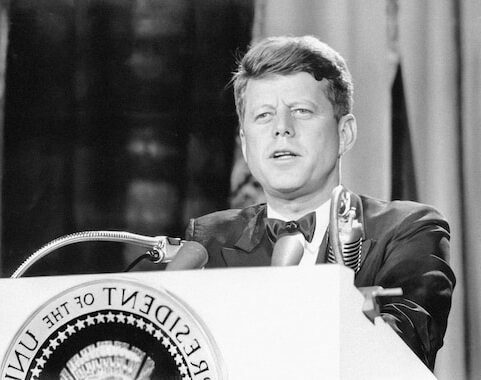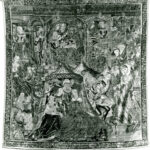John Fitzgerald Kennedy, often referred to as JFK, was born on May 29, 1917, in Brookline, Massachusetts, USA. He was the second son of Joseph P. Kennedy Sr. and Rose Kennedy, a prominent and wealthy Irish American family. John F. Kennedy would go on to become the 35th President of the United States, serving from January 20, 1961, until his tragic assassination on November 22, 1963.
Kennedy grew up in a politically active family, with his father serving as the U.S. Ambassador to the United Kingdom during his childhood. This exposure to politics and international affairs had a significant impact on young Kennedy’s worldview and ambitions. He attended Harvard University, where he studied government and international relations, graduating with honours in 1940.
With the outbreak of World War II, Kennedy enlisted in the United States Navy and served as the commander of a patrol torpedo boat in the Pacific theatre. During a naval battle in 1943, his boat, PT-109, was rammed by a Japanese destroyer, resulting in the death of two crew members. Despite suffering injuries, himself, Kennedy displayed remarkable courage by leading the survivors to safety. This heroic incident earned him the Navy and Marine Corps Medal for his bravery.
After the war, Kennedy embarked on a career in politics. In 1946, he ran for the U.S. House of Representatives from Massachusetts’ 11th congressional district and won, becoming the youngest elected member of Congress at the age of 29. He served three terms in the House before successfully running for the U.S. Senate in 1952. As a senator, Kennedy gained recognition for his strong support of civil rights and his opposition to communism.
In 1960, Kennedy announced his candidacy for the presidency of the United States. He faced a tough primary battle against seasoned politicians, but his charisma, youthful energy, and ability to connect with voters propelled him to victory in the Democratic Party’s nomination. In the general election, Kennedy faced off against Republican candidate Richard Nixon. The election was closely contested, but Kennedy ultimately won by a narrow margin, becoming the youngest person ever elected to the presidency at the age of 43.
As president, Kennedy focused on several key domestic and foreign policy initiatives. His administration championed the Civil Rights Movement, with Kennedy publicly endorsing desegregation and submitting a comprehensive civil rights bill to Congress. He also launched the Peace Corps, an initiative that aimed to promote volunteerism and social progress in developing countries.
Kennedy’s presidency was marked by intense Cold War tensions between the United States and the Soviet Union. In 1962, he faced one of the most critical challenges of his presidency during the Cuban Missile Crisis. Kennedy’s skilled diplomacy and resolve led to a peaceful resolution, averting a potential nuclear war.
Tragically, Kennedy’s presidency was cut short by an assassin’s bullet on November 22, 1963, in Dallas, Texas. His assassination shocked the nation and the world, leaving a lasting impact on American history. Despite his abbreviated term in office, Kennedy’s charisma, vision, and leadership have made him one of the most iconic figures in American politics.
John F. Kennedy’s legacy extends beyond his presidency. He remains a symbol of hope, inspiration, and idealism, with his speeches and actions continuing to resonate with generations of Americans. His untimely death has perpetuated a fascination with his life and the unanswered questions surrounding his assassination, making him a subject of extensive historical and conspiracy theories research.
Sources:
John F. Kennedy – Quotes, Wife & Assassination (biography.com)
Life of John F. Kennedy | JFK Library
John F. Kennedy: Campaigns and Elections | Miller Center
John F. Kennedy: Foreign Affairs | Miller Center







